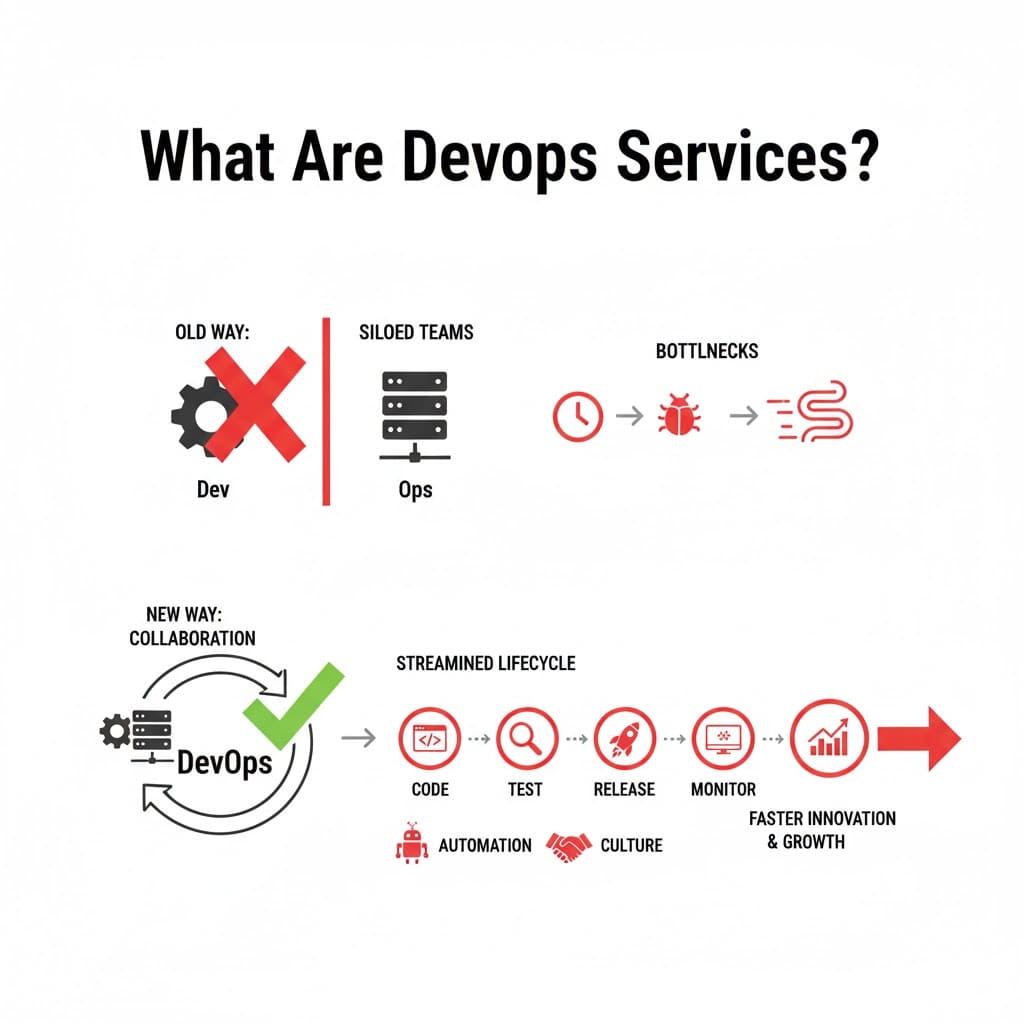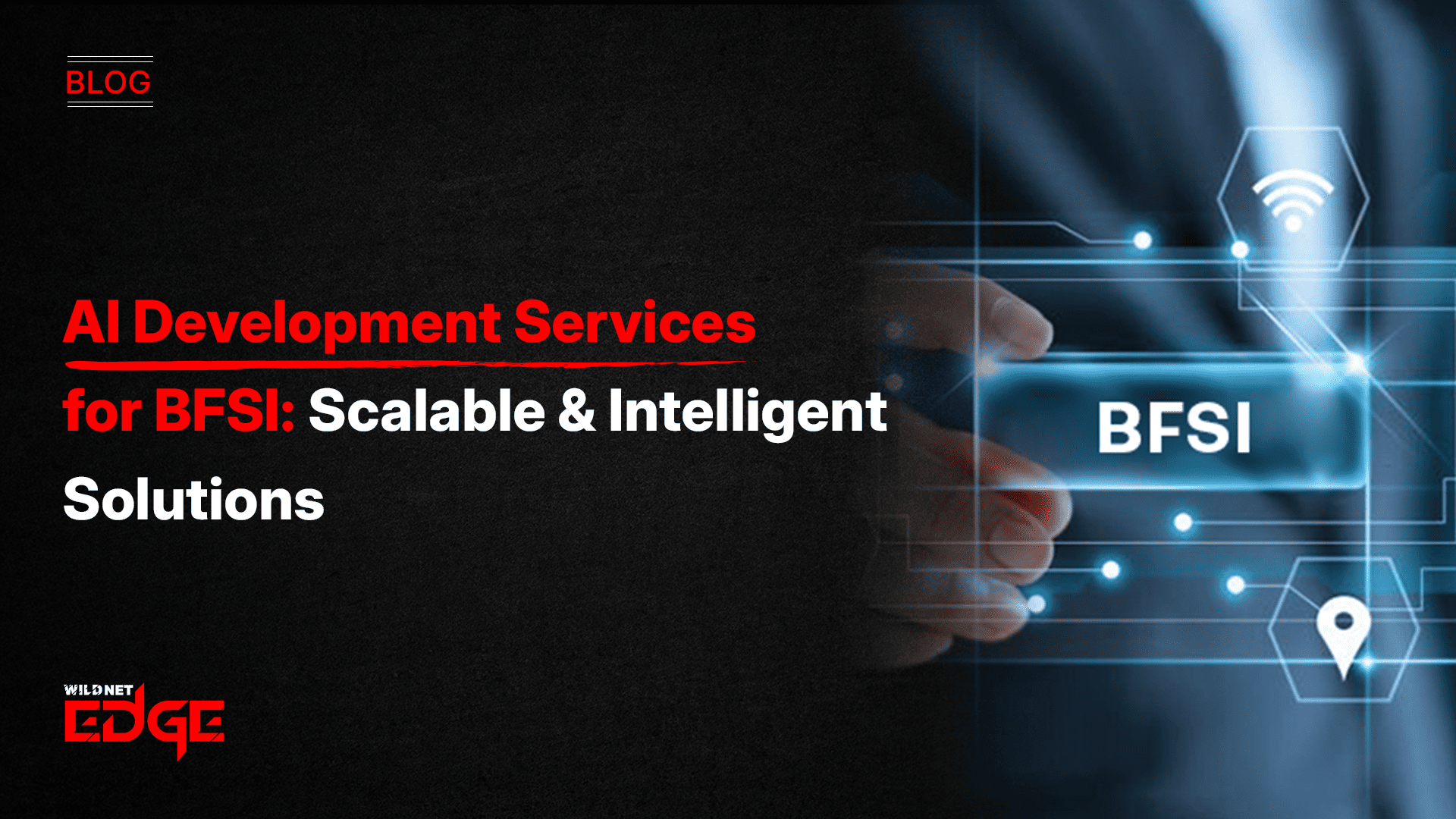In today’s market, speed is everything. Businesses that can innovate, release new features and respond to customer feedback the fastest are the ones that win. However, traditional software development can be slow and disconnected. This is where DevOps comes in. It is a powerful approach that can transform how you build and deliver software. This guide will show you the key DevOps services benefits and why they are essential for your growth.
What Are DevOps Services, Really?
First, let’s make it simple. DevOps is not just a tool or a team. Instead, it is a culture and a set of practices. It brings your software development (Dev) and IT operations (Ops) teams together. In the past, these teams often worked in separate silos. This separation created bottlenecks and slowed things down.
DevOps breaks down those walls. As a result, teams can work together more closely through the entire software lifecycle. This collaboration is powered by automation and streamlined workflows. Ultimately, professional DevOps Services help you implement this culture and the tools needed to support it, making your business more agile and efficient.

Key DevOps Services Benefits for Your Business in 2025
Adopting DevOps is more than a technical upgrade; it’s a strategic business decision. The benefits directly impact your revenue, efficiency and ability to compete.
Dramatically Faster Time-to-Market
One of the biggest DevOps services benefits is speed. By automating the build, test and release process, you can get new features and products to your customers much faster. This is achieved through a practice called continuous delivery. Instead of large, infrequent releases, you can deploy small updates safely and quickly. According to the DORA State of DevOps Report, elite performers deploy code on-demand, multiple times per day, which is a huge competitive advantage.
Improved Quality and Reliability
You might think that moving faster means breaking more things. However, with DevOps, the opposite is true. Because you are releasing smaller changes more often, it is easier to find and fix bugs. In addition, extensive automation in software testing catches issues early in the development cycle. This focus on quality means your customers get a more stable and reliable product, which builds trust and reduces support costs.
Enhanced Collaboration and Team Culture
DevOps creates a culture of shared responsibility. When developers and operations staff work together, they gain a better understanding of each other’s challenges. This leads to better communication and a more positive work environment. Consequently, your teams become more engaged and productive. They stop blaming each other and start working together to solve problems for the business.
Greater Security and Compliance
Security is another one of the major DevOps services benefits. The practice of integrating security into every stage of the development lifecycle is often called DevSecOps. Instead of treating security as a final step, it becomes an automated and continuous part of the process. This approach helps you identify vulnerabilities early, reduce risks and ensure you meet compliance standards without slowing down development.
The Core Pillars of Modern DevOps
To deliver these benefits, DevOps relies on a few core technical practices. Understanding them helps you see how the magic happens.
CI/CD Pipelines
Continuous Integration and Continuous Delivery, or CI/CD pipelines, are the backbone of DevOps. CI is the practice where developers merge their code changes into a central repository frequently. After that, automated builds and tests are run. Continuous delivery extends this by automatically deploying all code changes to a testing or production environment after the build stage. These pipelines are the engine for speed and quality.
Infrastructure as Code (IaC)
Infrastructure as Code means managing your IT infrastructure using configuration files. Instead of manually setting up servers and networks, you define everything in code. This allows you to build and replicate your systems quickly and consistently. Moreover, our Cloud Infrastructure Services leverage IaC to create scalable and resilient environments for your applications.
Our DevOps Services in Action: Case Studies
Case Study 1: Accelerating a SaaS Platform’s Feature Releases
- The Challenge: A company offering SaaS Development Services had a slow and error-prone release process. It took them weeks to deploy a single new feature, which frustrated their customers and developers.
- Our Solution: We implemented fully automated CI/CD pipelines. This included automated testing for every code change and a one-click deployment process to their cloud environment.
- The Result: As a result, their deployment frequency went from once a month to multiple times a week. Customer-reported bugs dropped by 60% and their developers could focus more on innovation.
Case Study 2: Improving E-commerce Platform Stability
- The Challenge: A major online retailer was experiencing frequent downtime during peak shopping seasons. Their manual infrastructure management could not keep up with traffic spikes.
- Our Solution: We used Infrastructure as Code to redefine their cloud setup. We also implemented advanced monitoring and automated scaling to handle traffic surges gracefully.
- The Result: The platform achieved 99.99% uptime during the next holiday season. In addition, their infrastructure costs were reduced by 25% due to efficient, automated resource management.
Our DevOps and Cloud Technology Stack
We use a modern, powerful set of tools to deliver our DevOps services. We choose the right tools to build robust and efficient Software Development Solutions for your specific needs.
- CI/CD Tools: Jenkins, GitLab CI, CircleCI, Azure DevOps
- Containerization: Docker, Kubernetes
- Configuration Management: Ansible, Puppet, Chef
- Infrastructure as Code: Terraform, AWS CloudFormation
- Cloud Platforms: Amazon Web Services (AWS), Microsoft Azure, Google Cloud Platform (GCP)
- Monitoring: Prometheus, Grafana, Datadog
Conclusion
The DevOps services benefits are clear. It’s about much more than just tools; it is a fundamental shift in how you deliver value to your customers. By embracing practices like continuous delivery and building effective CI/CD pipelines, you can release better software, faster. At Wildnet Edge, we believe in building for the future. Our AI-first approach to DevOps means we not only automate your processes today but also implement intelligent monitoring and predictive analytics. This helps you anticipate issues before they happen, ensuring your systems are always running at peak performance.
FAQs
The ROI of DevOps is significant. It comes from reduced development costs, lower operational overhead and faster revenue generation from new features. Businesses often see improvements in customer retention due to higher product quality and reliability.
DevOps is for any business that wants to improve its software delivery process. While startups adopt it naturally, established enterprises see huge benefits by breaking down internal silos and modernizing their legacy systems. It’s about the mindset, not the company’s age.
You can see initial benefits, like improved deployment frequency, within a few months. However, the full cultural shift and larger business impacts, like cost savings and improved stability, typically become clear within 6 to 12 months of a dedicated implementation.
The biggest challenge is usually cultural change, not technology. Getting teams that have worked separately for years to collaborate and share responsibility requires strong leadership and a clear vision. This is where an experienced partner can guide you.
DevOps reduces costs in several ways. For example, automation in software and infrastructure reduces manual work. Also, improved stability means less money spent on fixing outages. Finally, faster releases mean your development resources are used more efficiently.
We apply AI through a practice called AIOps. This means using artificial intelligence to automate and improve IT operations. For instance, we can use AI to predict system failures, analyze performance data to find root causes faster and optimize your cloud spending automatically.
The first step is a discovery workshop. We’ll sit down with your team to understand your current processes, pain points and business goals. From there, we can build a strategic roadmap to help you achieve a successful DevOps transformation.

Managing Director (MD) Nitin Agarwal is a veteran in custom software development. He is fascinated by how software can turn ideas into real-world solutions. With extensive experience designing scalable and efficient systems, he focuses on creating software that delivers tangible results. Nitin enjoys exploring emerging technologies, taking on challenging projects, and mentoring teams to bring ideas to life. He believes that good software is not just about code; it’s about understanding problems and creating value for users. For him, great software combines thoughtful design, clever engineering, and a clear understanding of the problems it’s meant to solve.
 sales@wildnetedge.com
sales@wildnetedge.com +1 (212) 901 8616
+1 (212) 901 8616 +1 (437) 225-7733
+1 (437) 225-7733
















 AI Development Services
AI Development Services Industry AI Solutions
Industry AI Solutions AI Consulting & Research
AI Consulting & Research Automation & Intelligence
Automation & Intelligence













